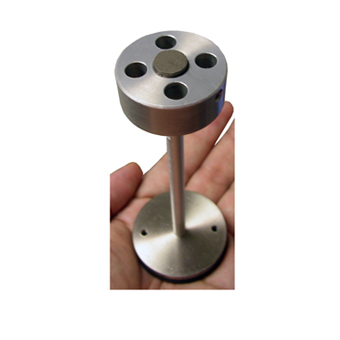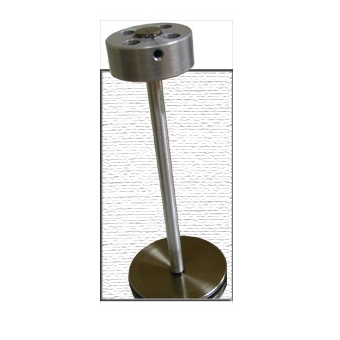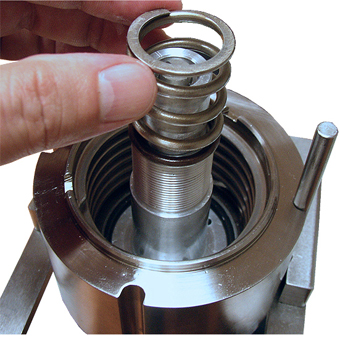PVT Tester
M7500 PVT Ultra HPHT Pycnometer

M7500 PVT Ultra HPHT Pycnometer Top View

M7500 PVT large piston Side View

M7500 PVT small piston



Simple and Dependable Testing
The Grace Instrument M7500PVT Ultra HPHT Pycnometer (PVT Tester) is an add-on module for the M7500 Ultra HPHT Rheometer and provides a means for testing liquid density changes under simulated downhole conditions, such as those found in deep oil or geothermal wells.
The M7500PVT module is also designed to test solid samples such as cements, cores, or other solids.
Both sample types can be tested without contamination by pressurization fluid.
The patented M7500PVT module includes two pistons — large and small. The large piston is intended for tests involving larger changes in sample density. The small piston is intended for tests involving smaller changes in sample density, with a corresponding need for greater accuracy.
These tests are created and administered by the user with the M7500 PC software, M7500DAQ. Test results can be exported directly into Microsoft Excel or saved as a standard .CSV text file.
| U.S. Patent: 8,156,798 |
| Dimensions: 22" Height x 12" Width x 24" Depth |
| Resolution: 0.5% of initial density |
| Temperature Range: Ambient (20° with chiller) to 600°F (315°C) |
| Pressure Range: Atmospheric to 30,000 psi |
| Density Range: 71% to 142% |
| Sample Size: Small Piston: 185 to 193 ml Large piston: 120 to 170 ml |
| Compressibility Range: 150 rpm |
| Compliance: API Spec 10A/ ISO 10426-1 |
- M7500 PVT is an add-on module for M7500 Ultra HPHT Rheometer
- Patented M7500 Ultra HPHT Rheometer is capable of testing fluid viscosity under conditions of temperature and pressure ranging from atmospheric to 30,000 psi and from 20°F (with chiller) to 600°F (315°C).
- M7500 add-on modules provide powerful new functionality at a lower cost than competing, stand-alone instruments, while maintaining a single instrument footprint and merging seamlessly with your existing software training.
- More specifications and other information can be found on our M7500 Ultra HPHT Rheometer page.
Downloads for the M7500 PVT Ultra HPHT Pycnometer:
Read more about our instrument's technical applications within these scientific and academic publications:
-
SPE-170281-MS 2014
Experimental Study Improves Prediction of PVT Behavior of Completion Brines
PVT Measurement on a range of selected completion brines with nominal densities, and determine density profile under downhole conditions. M7500 was used to conduct PVT test at pressure up to 30,000 psi and temperature from 35 °F to 500 °F.
https://www.onepetro.org/conference-paper/SPE-170281-MS
-
OMAE2013-11428 2013
Issue with the Density and Rheology of Drilling Fluids Exposed to Extreme Temperature and Pressures
Discuss the issues from well-integrity perspectives, with focus on determining hydrostatic pressures and rheological properties under down-hole conditions. M7500 was used to measure viscometric data.
http://dx.doi.org/10.1115/OMAE2013-11428
-
AADE-12-FTCE-44 2012
Measuring PVT Characteristics of Base Oils, Brines, and Drilling Fluids Under Extreme Temperatures and Pressures
Measure PVT characteristics of base oil, brine, and drilling fluid under different temperatures and pressure. Evaluate the accuracy and usability of Ultra HPHT Rheometer over wide range of temperature and pressures. M7500 was used to measure volumetric behavior of base oils, brines, and synthetic oil, and water based drilling fluids at temperature from ambient to 600°F (315°C), and pressure from atmospheric to 30,000 psi.
http://www.aade.org/app/download/7242008476/AADE-12-FTCE-44+-+Zamora.pdf
-
SPE 160029 2012
Study on the Volumetric Behavior of Base Oils, Brines, and Drilling Fluids under Extreme Temperatures and Pressures
Measure PVT data and volumetric behavior of oil, synthetic, and brine based drilling fluids under extreme temperatures and pressures. M7500 was used to test compressibility and thermal expansion of liquid and solid samples.
http://dx.doi.org/10.2118/160029-PA

